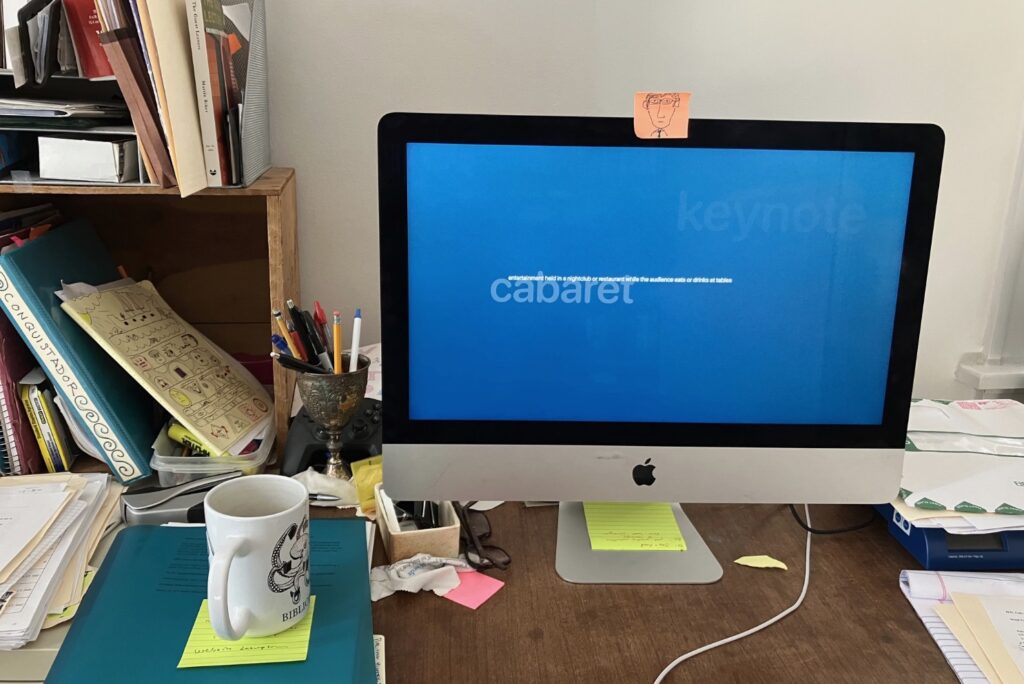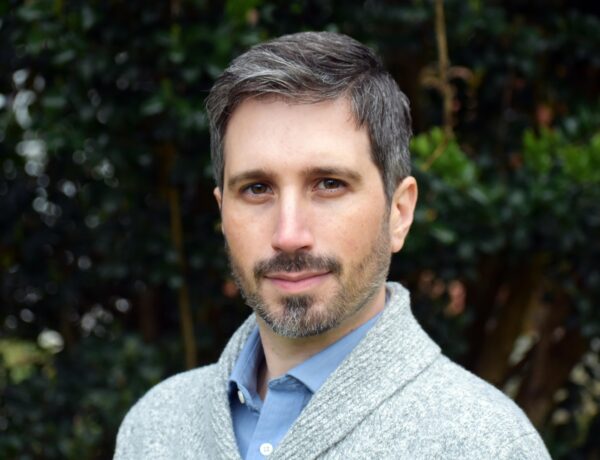Born and raised in Central Pennsylvania, Martin Riker began his professional career as a musician, playing piano and trombone.
However, he eventually transitioned to literature and spent the majority of his thirties in the literary publishing industry, holding positions such as editor for the Review of Contemporary Fiction, Associate Director of Dalkey Archive Press, and founding managing editor of CONTEXT: A Forum for Literary Arts and Culture. He went on to earn a PhD and co-founded, with his wife Danielle, the feminist publishing house Dorothy.
Riker has published two novels, The Guest Lecture (Grove Press, 2023) and Samuel Johnson’s Eternal Return (CHP, 2018), and frequently contributes reviews, interviews, and criticism to publications such as the Wall Street Journal, New York Times, and Paris Review Daily. By day, he works as a professor in the English Department at Washington University in St. Louis, where he teaches courses in literature, criticism, and publishing.
Each week, we publish a new daily writing routine from a famous author. Subscribe to our newsletter so you don’t miss out!
Hi Martin, welcome to Famous Writing Routines, great to have you here with us today! Can you tell us about your transition from being a musician to a literary professional, and eventually becoming a published author yourself?
Well my undergrad degree was in English/writing but after school I worked as a trombonist and pianist, first in Pittsburgh (where I went to school), and then on cruise ships, and eventually in New York. What made this musician period of my life relevant to the later literary period of my life was that I had a lot of free time to read.
I spent a good chunk of my twenties just reading books, and eventually I was reading the entire list of certain publishing houses that interested me, including Dalkey Archive, where I eventually went to work. I’m not a very ambitious person, and certainly in my twenties I was not a person who planned things ahead of time. I never imagined the reading I was doing would prepare me for a job, but in fact that period of intense reading ended up being the source of almost everything I’ve done since then.
What inspired you to co-found the feminist publishing house Dorothy? Can you share some of the most memorable books or authors you have published through the project?
My wife was the real impetus behind starting the publishing house. She noticed that most of the publishers of more experimental types of fiction had very heavily male lists, and she was convinced this was not a reflection of who was writing such work, only of who felt encouraged to submit it to publishers.
She wanted to create a space in the publishing culture where women who wrote formally innovative work would feel welcome. So that was how Dorothy got started. I had been working in publishing for about a decade by then, so my role was to help make it all work.
You have contributed reviews, interviews, and criticism to several prestigious publications such as the Wall Street Journal, New York Times, and Paris Review Daily. Can you talk about how your experience in these roles has influenced your writing style?
That is a better question than you probably even realize. I’ve been writing fiction since undergrad, but I didn’t really publish anything for years, for the very good reason that it wasn’t very good. I think starting to write book reviews for major venues was a very important step for me, as it forced me into a kind of narrative and linguistic discipline that my work up to that point had lacked.
It was the word count restriction, and having to “do” a lot in that small space, and having to think about how it would sound to four million anonymous readers. I actually have a PhD in Writing (from the University of Denver) but even then, well into my thirties, things had not really clicked for me. I mark the first pieces I wrote for the NYT and the WSJ as the real turning point, at least from a craft perspective.
What does a typical writing day look like for you?
The conditions in which I write are not exotic in any way. I work best in the morning, after I take my son to school. I usually get about two hours in before I have to turn to other things, my work as a professor or as a publisher.
Sometimes I work a little longer, but after 2pm my brain turns to mush. I’m not a fast writer. It takes me five or six years to write a book. I have never thought of writing as my career, but then I’m not sure I think of myself as having a career at all. It’s more like I have a number of different ways I spend my time, and some of them I make money for.
Discover the daily writing habits of authors like Stephen King, Neil Gaiman, and Gillian Flynn with Famous Writing Routines Vol. 1 and learn how to take your writing to the next level. Grab your copy today!
How do you balance your teaching and writing schedules, and what role does your academic career play in your writing life?
Teaching is an excellent job for someone who wishes to write. The schedule is fairly flexible and there are long stretches of time off, and the work is intellectually engaging and keeps your mind lively. I am not someone who wishes they could stop teaching and just write, or who sees teaching as their job and writing as their true passion. I think of teaching and writing as equal parts of my life (along with publishing and parenting).
If you could have a conversation with any author throughout history about their writing routine and creative process, who would that be and why?
To be honest I’m not that interested in knowing about other people’s processes, because I think how you work is really up to you. I do think what you’re doing with your website, surveying different writers and their processes, is interesting and valuable, but mostly because the variety itself points to how varied experiences really are.
I imagine I’m not a typical writer in most ways, but for someone out there, hearing about how I do things might allow them to say, Oh, okay, that guy’s as ordinary as I am. If I have to talk to any writer, it would be Fran Ross, whose novel Oreo is a perennial favorite.
I’d love to know about the books you’re reading at the moment. What have been some of your favourite recent reads?
I just reviewed a French book for the New York Times, Laurent Mauvignier’s The Birthday Party. I’m reading Damion Searls’s new translations of Thomas Mann’s stories, and Emily Hall’s The Longcut, and Regan Penaluna’s How to Think Like a Woman. I’m about to be reading Sabrina Orah Mark’s Happily, because I’m going to interview her for its publication in March.
What does your current writing workspace look like?
Like this!

Affiliate disclaimer: Some links on this website are affiliate links. We may earn a small commission if you make a purchase through these links, but only promote products we truly believe in. We disclose affiliate links and give honest reviews.



No Comments